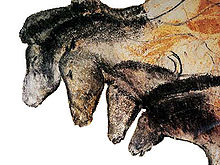
Cave of Forgotten Dreams – Werner Herzog’s fantastic film of the Chauvet cave – includes plenty of experts affirming that little is known about the purpose of the images of horses, cattle, reindeer, of lions, panthers, bears. And that the spectacular art’s early dating – c30,000 BCE – suggests that art arrived almost magically full of sophistication amongst homo sapiens, not evolved from simpler forms. (As Picasso remarked upon seeing the Lascaux caves: we have learnt nothing.)
And yet, for all the mystery, the evocative images have a power that is immediate and accessible. The art at least appears to speak directly across the millennia.
There are endless questions to answer. And what the experts unravel is fascinating. But given all the uncertainty, it seems perfectly possible to make a connection with our prehistoric ancestors, perhaps, I wonder, because uncertainty is what the cave is all about. What we don’t know might be a help, not a hindrance.
One of the archeologists captured the sense well, when describing how after 5 days working in the cave he had to take time out, to absorb what he was experiencing not as a scientist but as a human being. Did you have dreams, Herzog asked him? Yes. Were they of lions? Yes. Were they frightening? No: they were more about things that are deep and profound, things that elude capture by direct representation.
There you have it, or at least, there you have an ‘explanation’ that is as good as any you’re likely to get.
Another rock painting expert, with the advantage of having worked with Australian Aborigines, recalls the story of a scientist who was traveling to one site with an aborigine. The paintings were damaged and so the aborigine began to touch them up. Why are you touching them up, the scientist asked, for fear of losing evidence. I am not doing the painting, the aborigine replied, it is the spirit.
It’s perhaps a bit like the novelist who, after much effort, reaches the point where the characters write themselves. Or the musician who has the sense of the music playing them, not they the music.
The 20th century’s word for it is the unconscious, those caverns of the mind that are forever excluded from the daylight of consciousness, and yet, when tapped, release the energy of horses and lions into our lives.